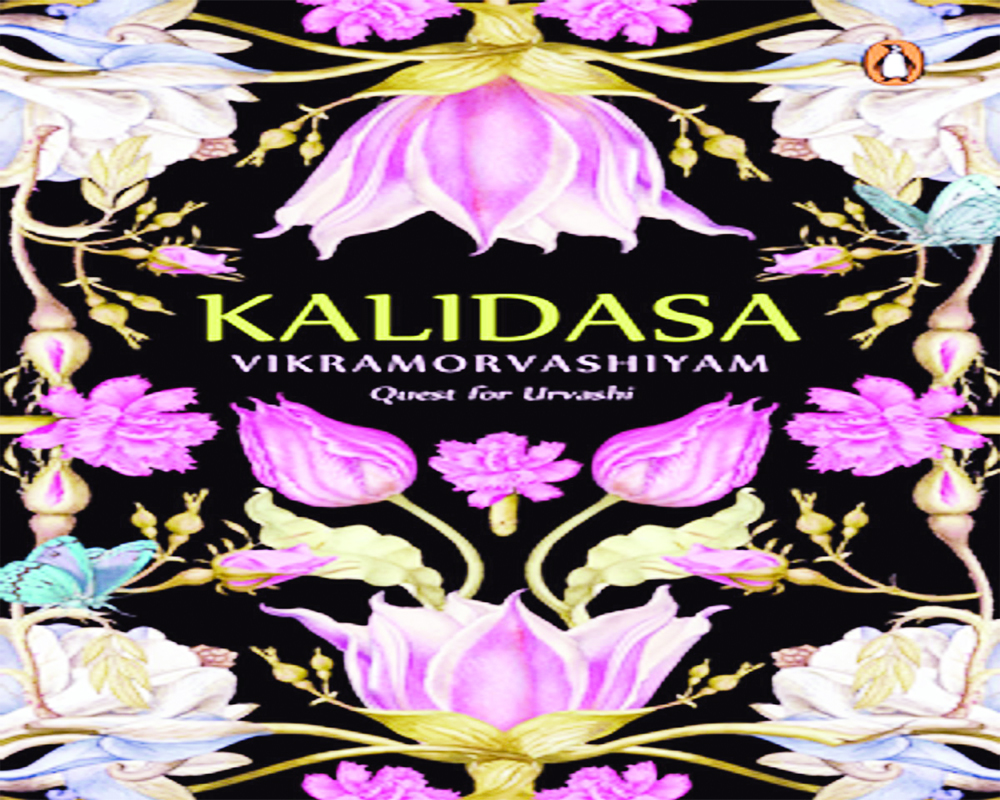Vikramorvashiyam: Quest for Urvashi
Author: Kalidasa
Translated by: A N D Haksar
Publisher: Penguin, Rs 499
Aditya Narayan Dhairyasheel Haksar’s translation of Kalidasa’s masterpiece Vikramorvashiyam lends a contemporary touch for the modern reader, writes Christy Varghese
Chitralekha: Friend, be at ease. The demon who defied the gods has been defeated.
Urvashi (opening her eyes): Was it by the power shown by the great god Indra?
Chitralekha: Not by the great Indra! But by this saintly king whose prowess is no less!
Urvashi (to herself, after seeing the king): The demon has done me a favour.
King (to himself, after seeing Urvashi back to normal): I now understand why all the nymphs who were sent to seduce the sage Narayana, were embarrassed on seeing what emerged from his thigh. But how could a sage create her?
Indeed the moon, all creatures’ lord,must have given her this glow,or Madana, the god of love,whose special rasa is erotic,or the season that brings flowers:for how could an ancient sage,his person with scriptures rigid,and interest in pleasures gone,create such an enchantress?
And thus begins the passionate exchange between King Pururavas and Urvashi, celestial nymph extraordinaire...
While we kicked off this review with a short excerpt from the book, we have to confess that we were hooked right off the bat. Beginning with the introduction, penned by the translator, Aditya Narayan Dhairyasheel Haksar, himself for his rendition of Kalidasa’s Vikramorvashiyam, you would lose yourself to a world where celestial beings traverse the earthly plane. And we believe you would be eager to finish reading this translation of the play in one sitting, just like we did. Those interested in the scholarly consideration and critical understanding of plays will find a friend in Haksar, who has provided a copious amount of notes through the book.
Inspired by a hymn from the Rig Veda, the oldest known Vedic Sanskrit text, Vikramorvashiyam underwent modifications with every retelling in Puranic literature. Down the line, it is understandable that Kalidasa made some changes and additions of his own, for dramatic effect, to his version.
While there are several prominent schools of thought on what the title implies, the most widely accepted translation of Vikramorvashiyam is ‘Urvashi won by valour’. The five-act play revolves around the romantic tale of Urvashi, an apsara from Indra’s court, and Pururavas, mortal ruler of Pratishthana.
After Pururavas rescues Urvashi from the clutches of a demon that abducted her, they are besotted with each other. However, this poses serious problems. To the uninitiated, celestial nymphs like Urvashi are expected to be subservient at Indra’s court. When she accidentally utters her newfound lover’s name during a drama staged by Sage Bharata at the court of the King of Gods, the celestial sage curses her in a fit of rage and banishes her from heaven. Matters are coming to a head on the earthly plane where Queen Aushinari, chief wife of Pururavas, discovers that her king now fancies someone else and expresses her displeasure with the same. However, she later makes peace with Pururavas by conveying that she accepts the situation for what it is and cedes ground by consenting to his union with Urvashi.
Just when it looks like the pair are in for a happy ending on Earth, they fall prey to another curse and what follows is a pure poetic delight. While the tale has its ups and downs, in a sense everything turns out for the best.
The book completes Penguin Classics’ special series on Kalidasa, considered to be among ancient India’s greatest poets and playwrights. Although very little is known about his life, Kalidasa’s popularity has endured for centuries through three plays, two epic poems and two lyric poems.
The first English translation of Vikramorvashiyam, by an Oxford professor of Sanskrit, appeared in 1849. This was followed by numerous translations over the years and the play’s most recent English translation appeared in 1984, courtesy of Columbia University academic, David Gitomer. Haksar’s translation is based on H D Velankar’s version of the play, authorised and published by the Sahitya Akademy in 1961, while also consulting a well-known text that was edited and translated the original play with a Sanskrit commentary by M R Kale in 1889.
Getting back to our take on the book, Haksar has brought forth a contemporary touch to a direct translation of the wide range of emotions, scenes and moods employed by Kalidasa while preserving its poetic nobility.
The most prominent instance, according to us, among them being the god-like qualities of total forgiveness and moral high handedness being displayed by a mere human such as Pururavas’ wife. How many of us can measure up to her, disregarding our own feelings just so that the person we love may attain what they seek?
Urvashi’s origins, too, are characterised by such traits. The Bhagavata Purana tells how once sages Nara-Narayana were meditating and their austere penance alarmed the gods so much that Indra sent apsaras to distract them. The sage Narayana took a flower and placed it on his thigh and from it sprung Urvashi whose charms far excelled those of the apsaras sent by Indra. They returned to heaven, filled with shame and vexation at this embarrassment. Surprisingly, Narayana sent Urvashi to Indra along with the other apsaras and continued to meditate.
On a contrary note, celestial beings have been shown to throw tantrums and indulge in somewhat passive behaviour, not unlike what a human who has been scorned is prone to. Quoting Haksar from his introduction, even when Urvashi takes her time to warm up to Pururavas, on account of the trials and tribulations that came her way due to a curse, she is depicted as ‘a person with human compassion rather than divine disdain.’
Drawing on nuances such as these, ace translator of Sanskrit-classics, Haksar has retained the essence of Kalidasa’s original work while reworking it for the modern reader.


























